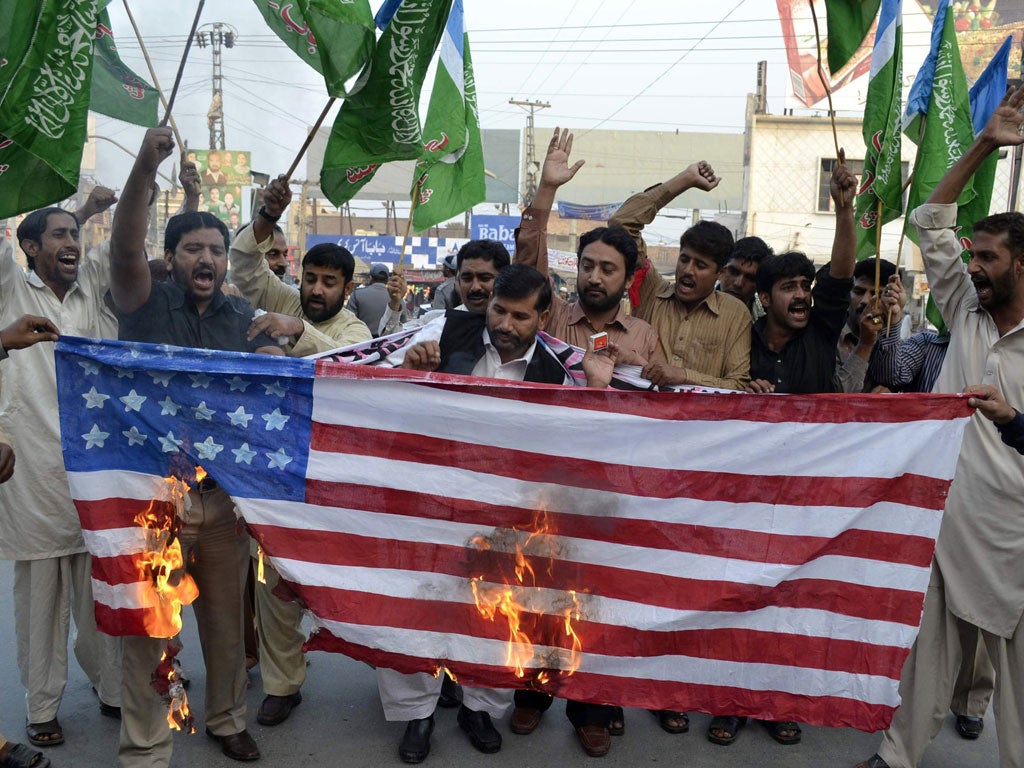US accepts some blame for Nato strike that killed Pakistani troops
Hopes of easing fraught diplomatic relations come as Islamabad faces fresh political crisis

A lack of trust, poor coordination and inaccurate maps were responsible for the Nato strike that left 24 Pakistani troops dead and relations between Washington and Islamabad at a new low, a Pentagon investigation concludes.
While placing blame on both sides, the US report apparently accepts that American and Afghan commandos were wrong when they concluded there were no Pakistani troops in the area where they were conducting an operation.
When the troops came under fire, they called in an airstrike from F-15 fighter bombers, Apache attack helicopters and an AC-130 Spectre gunship, believing they were being attacked by militants. It remains unclear why Pakistani forces fired at the Americans and Afghans, though they too may have believed they were being approached by Taliban fighters. The report, which it is hoped will allow for improved relations between the two countries, says US and Afghan forces acted in self-defence.
"Inadequate coordination by US and Pakistani military officers operating through the border coordination centre – including our reliance on incorrect mapping information shared with the Pakistani liaison officer – resulted in a misunderstanding about the true location of Pakistani military units," said a statement released in Washington.
The attack on 26 November triggered outrage in Pakistan and led the authorities to close its border with Afghanistan to Nato trucks, and to refuse to participate in an international conference about the future of Afghanistan. The US was also ordered to leave the Shamsi airbase in the far south-west of Pakistan, a site reportedly used to maintain drones used to attack suspected militants.
Last night, there was no official response from the Pakistani authorities to the report, due to be passed to US politicians today, but some analysts said they believed the US's acceptance of at least some responsibility could help ease tensions. "To the extent that they have accepted responsibility, that will help to bring a thaw in relations," said retired General Talat Masood. "I think both countries need each other. The marriage is going through a bad patch, but they are trying to stick together."
The report comes at a time of fresh crisis for Pakistan, with its civilian government locked in dispute with the powerful military over the ramifications of a now notorious memo.
Yesterday, Prime Minister Yousaf Raza Gilani warned there were plots to undermine the government. "I want to make it clear today that conspiracies are being hatched here to pack up the elected government," he said as he delivered strongly-worded rebukes, firstly to unidentified persons he said were trying to undermine the elected government, and later to the military.
Referring to testimony delivered to the Supreme Court by the ministry of defence that it did not exercise operational control over the armed forces, he said: "If they say that they are not under the ministry of defence, then we should get out of this slavery, then this parliament has no importance, this system has no importance, then you are not sovereign. Nobody is above the law, all the institutions are subservient to the parliament... They have to be answerable to this parliament. They cannot be a state within a state."
Mr Gilani's comments underscore growing frustration with the military. Last week, the prime minister rejected the notion that there was bad blood between the civilian leadership and the armed forces, headed by Gen Ashfaq Kayani. In the aftermath of the May raid by US forces that killed Osama bin Laden and deeply embarrassed Pakistan's armed forces, Mr Gilani spoke out in support of the military.
Earlier this year, Pakistan-American businessman Mansoor Ijaz claimed in a newspaper article that he had been asked to pass on a message to the US military, asking for help to rein in Pakistani generals after the attack that killed Bin Laden. Mr Ijaz claimed Husain Haqqani, Pakistan's ambassador in Washington, had asked for his help.
The controversy has already claimed the scalp of Mr Haqqani, forced out, apparently at the insistence of the military even though he denied involvement.
It also threatens President Asif Ali Zardari, who yesterday returned to Islamabad after recuperating from a mini-stroke. At the request of opposition politician Nawaz Sharif, the Supreme Court has launched an investigation into so-called Memogate. The army has denied it was ever planning a coup against the civilian government.
Join our commenting forum
Join thought-provoking conversations, follow other Independent readers and see their replies
Comments
Bookmark popover
Removed from bookmarks